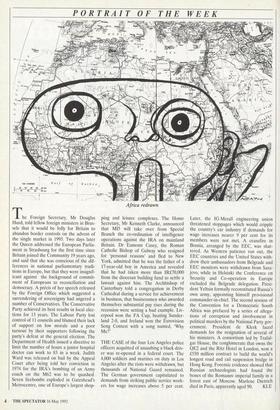PORTRAIT OF THE WEEK
Africa redrawn The Foreign Secretary, Mr Douglas Hurd, told fellow foreign ministers in Brus- sels that it would be folly for Britain to abandon border controls on the advent of the single market in 1993. Two days later the Queen addressed the European Parlia- ment in Strasbourg for the first time since Britain joined the Community 19 years ago, and said that she was conscious of the dif- ferences in national parliamentary tradi- tions in Europe, but that they were insignif- icant against the background of commit- ment of Europeans to reconciliation and democracy. A précis of her speech released by the Foreign Office which suggested a surrendering of sovereignty had angered a number of Conservatives. The Conservative Party achieved its best results in local elec- tions for 13 years. The Labour Party lost control of 11 councils and blamed their lack of support on low morale and a poor turnout by their supporters following the party's defeat at the general election. The Department of Health issued a directive to limit the number of hours a junior hospital doctor can work to 83 in a week. Judith Ward was released on bail by the Appeal Court after being told her conviction in 1974 for the IRA's bombing of an Army coach on the M62 was to be quashed. Seven firebombs exploded in Gateshead's Metrocentre, one of Europe's largest shop-
ping and leisure complexes. The Home Secretary, Mr Kenneth Clarke, announced that MI5 will take over from Special Branch the co-ordination of intelligence operations against the IRA on mainland Britain. Dr Eamonn Casey, the Roman Catholic Bishop of Galway who resigned for 'personal reasons' and fled to New York, admitted that he was the father of a 17-year-old boy in America and revealed that he had taken more than 1R£70,000 from the diocesan building fund to settle a lawsuit against him. The Archbishop of Canterbury told a congregation in Derby Cathedral during a service for achievement in business, that businessmen who awarded themselves substantial pay rises during the recession were setting a bad example. Liv- erpool won the FA Cup, beating Sunder- land 2-0, and Ireland won the Eurovision Song Contest with a song named, 'Why Me?'
THE CASE of the four Los Angeles police officers acquitted of assaulting a black driv- er was re-opened in a federal court. The 4,000 soldiers and marines on duty in Los Angeles after the riots were withdrawn, but thousands of National Guard remained. The German government capitulated to demands from striking public service work- ers for wage increases above 5 per cent.
Later, the IG Metall engineering union threatened stoppages which would cripple the country's car industry if demands for wage increases nearer 9 per cent for its members were not met. A ceasefire in Bosnia, arranged by the EEC, was shat- tered. As Western patience ran out, the EEC countries and the United States with- drew their ambassadors from Belgrade and EEC monitors were withdrawn from Sara- jevo, while in Helsinki the Conference on Security and Co-operation in Europe excluded the Belgrade delegation. Presi- dent Yeltsin formally reconstituted Russia's own army, appointing himself provisional commander-in-chief. The second session of the Convention for a Democratic South Africa was prefaced by a series of allega- tions of corruption and involvement in political murders by the National Party gov- ernment. President de Klerk faced demands for the resignation of several of his ministers. A consortium led by Trafal- gar House, the conglomerate that owns the QE2 and the Ritz Hotel in London, won a £550 million contract to build the world's longest road and rail suspension bridge in Hong Kong. Forensic evidence showed that Russian archaeologists had found the bones of the Romanov imperial family in a forest east of Moscow. Marlene Dietrich
died in Paris, apparently aged 90. KLE


















































 Previous page
Previous page